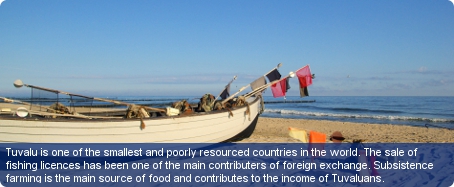Find a business in Tuvalu

Tuvalu is one of the smallest countries in the world in terms of population and area. The services sector contributes the most to GDP – 69% – and agriculture accounts for 22%. For a country with few resources and few sources of revenue Tuvalu has an impressive GNI per capita of US$4,760 and has seen growth of 2% per annum (2006-10). The marketability of its internet domain ‘.tv’ and remittances from overseas workers contribute significantly to Tuvalu’s economy.
Subsistence farming and fishing are the primary economic activities. Other sources of revenue for the economy come from small-scale copra exports, sale of postage stamps and coins, sale of passports and resale of rights to international telephone codes.
Bilateral aid and the Tuvalu Trust Fund support the government. The Trust Fund was set up by Australia, New Zealand, the UK, Japan and South Korea in 1987 who all contributed money amounting to A$27.1 million collectively. Wise investment by commercial fund managers has increased its value to A$116.5 million in 2011.
Tuvalu’s ‘.tv’ internet domain name is highly marketable and in demand from companies. The lease of the domain was sold to a company in December 2001 with an agreement that Tuvalu receives US$2.2 million a year plus 5% of revenue exceeding US$20 million per year for the company’s right to market ‘.tv’ until December 2016.
The public sector is dominant and most enterprises are owned by the government. In an effort to reduce its dependence on foreign aid, the government is pursuing public sector reforms, including privatization of some government functions and personnel cuts of up to 7%. The country has no known mineral resources and few exports.
Historically, Tuvalu has been one of the fastest growing economies in the region of the Pacific Islands. From 1988-98 GDP growth was 5.2% per annum and was generally good in 2002-07. However, the global economic downturn hit the island nation hard as the economy contracted by 0.6% in 2009 and 1.9% in 2010.
There are only 8km of roads on Tuvalu which are all tarred but there is a deep-water lagoon at Funafuti, the main island and capital; Funafuti also has the only airfield.
Tuvaluan and English are the official languages and around 75% of the labour-force works in the informal or subsistence economy.



